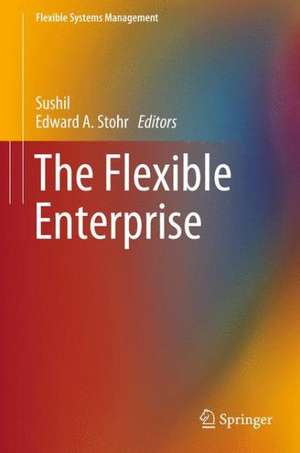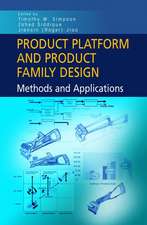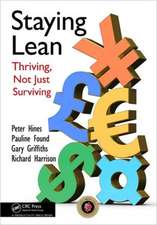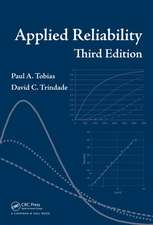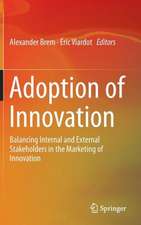The Flexible Enterprise: Flexible Systems Management
Editat de Sushil, Edward A. Stohren Limba Engleză Hardback – 10 dec 2013
I Enterprise and Strategic Flexibility
II Organizational Flexibility
III Business Process and Information Systems Flexibility
IV Operations Flexibility
| Toate formatele și edițiile | Preț | Express |
|---|---|---|
| Paperback (1) | 948.79 lei 6-8 săpt. | |
| Springer India – 27 aug 2016 | 948.79 lei 6-8 săpt. | |
| Hardback (1) | 954.93 lei 6-8 săpt. | |
| Springer India – 10 dec 2013 | 954.93 lei 6-8 săpt. |
Din seria Flexible Systems Management
- 18%
 Preț: 954.62 lei
Preț: 954.62 lei - 17%
 Preț: 460.35 lei
Preț: 460.35 lei - 15%
 Preț: 653.65 lei
Preț: 653.65 lei - 18%
 Preț: 953.35 lei
Preț: 953.35 lei - 15%
 Preț: 649.06 lei
Preț: 649.06 lei - 18%
 Preț: 1005.74 lei
Preț: 1005.74 lei - 15%
 Preț: 646.30 lei
Preț: 646.30 lei - 15%
 Preț: 643.84 lei
Preț: 643.84 lei - 18%
 Preț: 950.33 lei
Preț: 950.33 lei - 24%
 Preț: 802.76 lei
Preț: 802.76 lei - 18%
 Preț: 793.14 lei
Preț: 793.14 lei - 15%
 Preț: 584.58 lei
Preț: 584.58 lei - 15%
 Preț: 644.18 lei
Preț: 644.18 lei - 18%
 Preț: 1003.24 lei
Preț: 1003.24 lei - 18%
 Preț: 1008.12 lei
Preț: 1008.12 lei
Preț: 954.93 lei
Preț vechi: 1164.56 lei
-18% Nou
Puncte Express: 1432
Preț estimativ în valută:
182.75€ • 198.44$ • 153.51£
182.75€ • 198.44$ • 153.51£
Carte tipărită la comandă
Livrare economică 22 aprilie-06 mai
Preluare comenzi: 021 569.72.76
Specificații
ISBN-13: 9788132215592
ISBN-10: 8132215591
Pagini: 388
Ilustrații: XII, 374 p. 101 illus., 70 illus. in color.
Dimensiuni: 155 x 235 x 26 mm
Greutate: 0.72 kg
Ediția:2013
Editura: Springer India
Colecția Springer
Seria Flexible Systems Management
Locul publicării:New Delhi, India
ISBN-10: 8132215591
Pagini: 388
Ilustrații: XII, 374 p. 101 illus., 70 illus. in color.
Dimensiuni: 155 x 235 x 26 mm
Greutate: 0.72 kg
Ediția:2013
Editura: Springer India
Colecția Springer
Seria Flexible Systems Management
Locul publicării:New Delhi, India
Public țintă
ResearchCuprins
Part I Enterprise and Strategic Flexibility.- Chapter 1: The Concept of Flexible Enterprise.- Chapter 2: Creating Enterprise Flexibility through Service Oriented Architecture.- Chapter 3: Defining Strategic Flexibility.- Chapter 4: Flexible Strategy Framework for Managing Continuity and Change in E-government.- Chapter 5: Government Regulator’s Role in Managing Competition through Flexibility in Telecom Industry of India: A Policy Perspective.- Chapter 6: Theoretical Roots of Flexible Strategy Game-card: An Evolving Strategic Performance Management Framework.- Part II: Organizational Flexibility.- Chapter 7: Architecting Flexible Organizations.- Chapter 8: Towards Understanding the Effects of Outsourcing on the Flexibility Dynamic of System of Systems.- Chapter 9: Creating Order out of Disorder through Intuitive Flexibility.- Chapter 10: Framework for Utilization of Global Resources for Knowledge Creation and Application through Flexible Organizations.- Chapter 11: Flexibility, Controllability and Risk Measurement Metrics in Changing Pattern of Business Environment.- Part III: Business Process and Information Systems Flexibility.- Chapter 12: On How Agile Systems Gracefully Migrate Across Next-Generation Life Cycle Boundaries.- Chapter 13: In Pursuit of Workflow Breakthroughs Using Just Enough Process Management.- Chapter 14: Developing Flexible Business Process Management Systems Using Modular Computing Technologies.- Chapter 15: Rapid Deployment Approach through Flexible System Design: Breakthrough in Technology Innovation and Process Optimization for eClinical Trials.- Chapter 16: Information Systems Flexibility in Organizations: Conceptual Models and Research Issues.- Part IV: Operations Flexibility.- Chapter 17: Flexibility via Virtual Cellular System for Variability.- Chapter 18: Role of Manpower Flexibility in Lean Manufacturing.- Chapter 19: Supply Chain Flexibility: Some Perceptions.- Chapter 20: Marketing Flexibilities: Lessons from theCorporate.
Notă biografică
Sushil is Abdulaziz Alsagar Chair Professor (Professor of Strategic, Flexible Systems and Technology Management), and Chair, Strategic Management Group at the Department of Management Studies, Indian Institute of Technology Delhi, where he is currently Dean (Faculty). He has served as Visiting Professor and delivered seminars in many leading universities; such as, University of Minnesota, Minneapolis, MN, Stevens Institute of Technology, NJ, University of Lethbridge, Alberta, Université Paris 1 Panthéon-Sorbonne, Paris, among others. He is an active researcher and supervised more than 50 doctoral dissertations. He has 18 books to his credit in the areas of Flexibility, Strategy, Systems Thinking, and Technology Management and over 250 papers in various refereed journals and conferences. He is the Founder Editor-in-chief of Global Journal of Flexible Systems Management and serving on the Editorial Boards of leading international journals. Currently he is serving as Independent Director on Boards of RINL, HSCC, and River Engineering. Edward A. Stohr is Professor of Information Systems and Co-Director of the Center for Technology Management Research at the Howe school of Technology Management, Stevens Institute of Technology, NJ. Prior to joining Stevens in 2001, Professor Stohr was a faculty member at NYU’s Stern School of Business for over 20 years. During this time period, he served as Chair of the Department of Information Systems and as Director of Stern’s Center for Research on Information systems. His research focuses on the problems of developing computer systems to support work and decision making in organizations. He has published in leading management journals and co-edited three books on information systems. He was visiting professor at INSEAD in France, the University of Business and Economics in Vienna, the Hongkong University of Science and Technology, and Melbourne University. He is currently working on a research grant funded byNASA.
Textul de pe ultima copertă
The need for enterprise flexibility in an era of rapidly advancing technology, increasing competition, and globalization, is apparent. Flexibility can be thought of as an ability of the enterprise to quickly and efficiently respond to market changes and to bring new products and services quickly to the market place. Beyond this definition, a truly flexible enterprise should proactively change the market through its ability to create new and innovative products and services. The proposed book is intended to provide a conceptual framework of ‘Flexible Enterprise’ supported by researches/case applications in different types of flexibilities exhibited by a flexible enterprise. The selected papers covering a variety of issues concerning the planning and operation of a flexible enterprise are organized into following four parts:
I Enterprise and Strategic Flexibility
II Organizational Flexibility
III Business Process and Information Systems Flexibility
IV Operations Flexibility
I Enterprise and Strategic Flexibility
II Organizational Flexibility
III Business Process and Information Systems Flexibility
IV Operations Flexibility
Caracteristici
First comprehensive collection of research works on the concept of enterprise flexibility Provides conceptualization of different types of flexibility at one place Contains literature reviews, case studies and empirical studies on different facets of Flexible Enterprise
